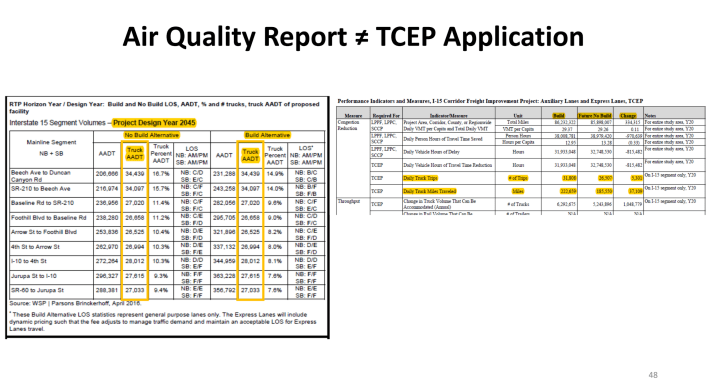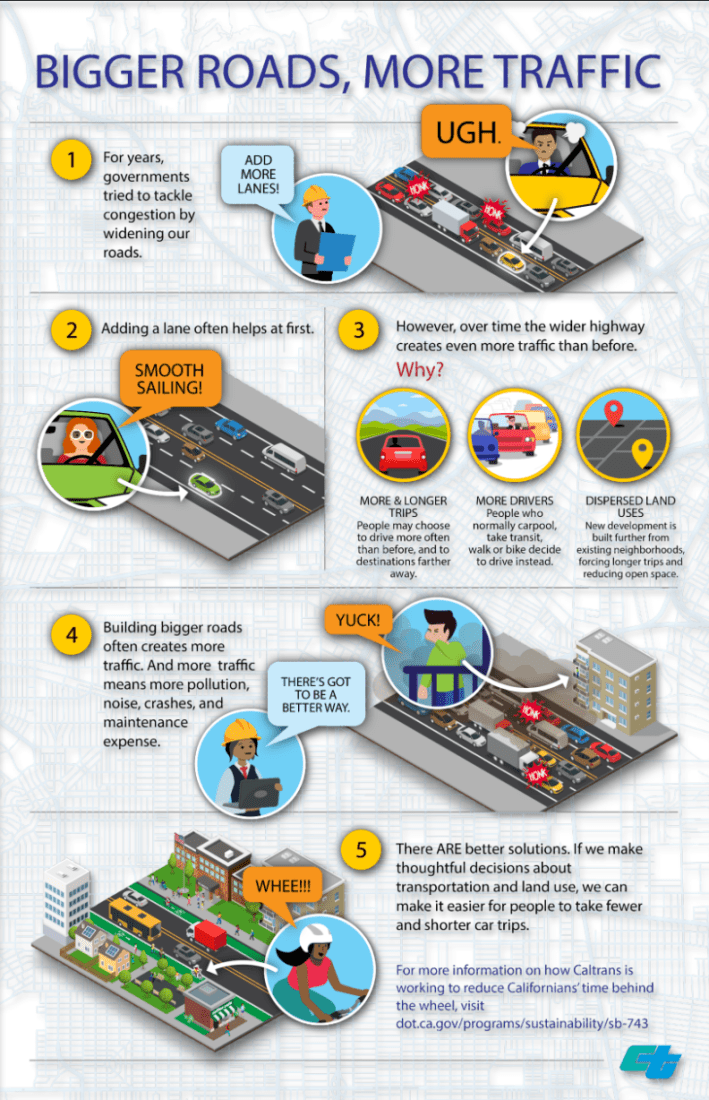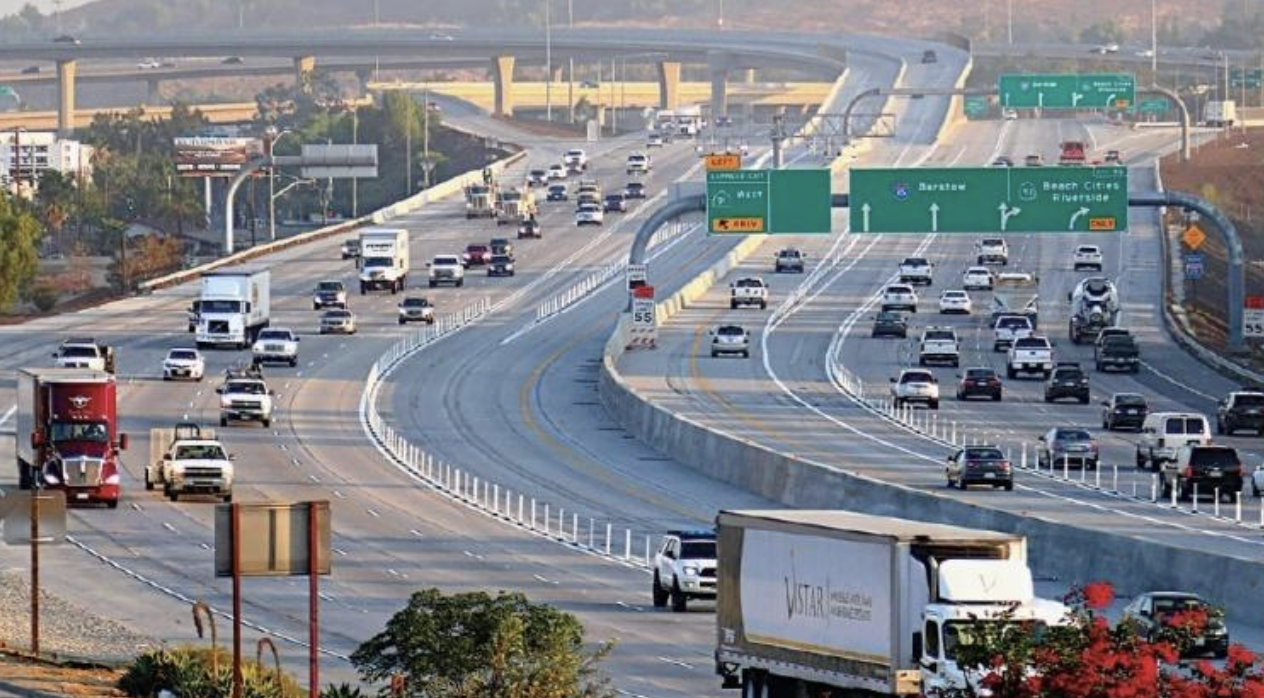Note: This post was updated to correct a few numbers - Joe Lyou served a four-year term on the CTC, and the number of estimated additional truck trips from the I-15 expansion is 5,301 per day.
Last month, the California Transportation Commission came to a rare impasse when it postponed approval of funding for a highway project that had been vetted by its staff and recommended for approval.
The delay sent sparks of hope through the ranks of advocates for climate and sustainability, who have been trying to convince state agencies to take a closer look at California's highway investments. They applauded the Commission for pausing to think through the chain of past investment decisions that led to this particular highway expansion. Like many other projects being considered for funding in this time of plenty - at least, for transportation projects - the I-15 expansion was envisioned, planned, and conceptually approved before California set new climate, equity, and clean air goals.
But most of the Commissioners made it clear they had no interest in revisiting the project, which would add "auxiliary lanes" and express lanes on the I-15 in the Inland Empire, in an area where the number of warehouses has been expanding quickly, close to residential areas that have already seen a steady increase in truck traffic in the last few years.
In fact, Commissioner Jay Bradshaw said, "I heard repeatedly from the opposition that... we did the right thing to slow our roll [and revisit the project], but that's not what happened. A motion was made based on staff recommendation - and after years and years of approvals. It was seconded, and then we deadlocked... We need to move this thing forward; the commitments were already made."
He added that the comments he heard were "very dismissive of what was said by a very diverse group of workers," but he and other Commissioners were similarly very dismissive of the testimony of those project opponents. Those opponents - also a diverse group of advocates, residents, and academics - discussed the bad air quality they live with, the conflict between highway expansion and state climate, environment, air quality, and equity goals, and the now well-known fact that highway expansions don't bring the congestion relief benefits they claim they will.
It's somewhat disturbing that Bradshaw and other commenters seemed angry at people for opposing the project. Several of the project proponents accused opponents of just trying to score "political points." It was clear that they weren't taking people's concerns seriously, and the whole process seemed to be heading towards an "us vs. them" argument - at least on the side of project proponents.
And it only got more combative. The Commissioners allowed public comment to go on past their planned adjournment time, and a reception and dinner beckoned. Then, over the strenuous objection of Commissioner Joe Lyou, who had a lot of questions to ask, the Commissioners voted to limit their own comments to two minutes.
Frustrated at being cut off, Lyou tried to speed through his concerns. He focused on asking why the San Bernardino County Transportation Agency and Caltrans told the EPA and the Transportation Conformity Work group that the amount of truck traffic would not change, but in their TCEP application for funding said it would increase.
"This shows an additional 5,301 truck trips per day as a result of this project. That adds up to an additional two million trips annually. That's completely different from what you told the Transportation Conformity Working Group," he said, pointing to a chart in the application. "What are we supposed to believe?"
"You need to ... get your story straight before we make a decision," he added. "I feel like it's inappropriate to turn your back on the truth of what's going on.

"I'm not ideological; I'm not dishonest; I'm not doing this for politics. I'm doing this because the process has to have integrity. If you say one thing, and then try to say something completely different--that's a problem," said Lyou. "It may involve fraud, it may involve violations of lots of laws - but that's what happened here," he said.
"I am really irate about having my ability to talk on this subject limited," he added. (Lyou had prepared slides to help him highlight his concerns. They show how thoroughly he reviewed the documents to answer his questions. See the slides here.)
Lyou's frustration drew anger from other members of the Commission, who seemed mostly focused on his use of the word "fraud."
Chair Lee Ann Eager asked representatives of the SBCTA to respond "to Commissioner Lyou's accusations" and - here, listen to it, at 2:11:20 on this recording - the response was a strangely patronizing gobbledygook.
"I think we all agree that the total distribution of trucks is the same in both [models], except that the growth forecast changed," said a very gravelly voiced Steve Smith of the SBCTA.
"It has to do with assuming a fixed distribution of truck trips; the truck trips were the same for both situations, except for the change in the growth forecast.... They laid it all out, in the attachments you received, why a fixed distribution was appropriate.... In our case we used what we call a redistribution of traffic. You are comparing two different numbers that had total transparency. They were in no way attempting to deceive anyone. But we have talked enough with Caltrans staff that do these kinds of analyses, and we are confident that we'll be totally above board in that analysis...we do not engage in fraud. We do not engage in falsification of data."
In the end, no one answered the basic question: will there be more truck traffic or not?
Except maybe they did, indirectly. Kome Ajise of SCAG told Lyou that "truck trips are not counted, because they are not discretionary. Whether the project is built or not, there will be the same number of truck trips."
He seems to be saying that truck trips, because they are commercial trips, are not subject to the law of induced demand. It's not the first time agencies have made the claim that new truck trips "don't count."
But research shows otherwise. It's a big flaw in current California planning practice if truck trips are treated differently from vehicle trips. And it heavily impacts communities in the corridor, and residents who are trying to find a way to speak up about it.
In the end, the Commission quickly voted to approve the project, basically saying they had no choice but to approve something that had gotten this far along in the process. But that leaves the question: when is the right time to raise the concerns of residents and others worried about the climate and clean air? Because experience shows it is very hard to get concerns listened to, at any stage of the process.

And unfortunately, Commissioner Lyou's term at the Commission ended after this meeting. He had been appointed by Assembly Speaker Anthony Rendon, and his four-year term was up. Rendon's successor, Robert Rivas, appointed Bob Tiffany to replace him. According to Politico, Tiffany is an auto dealer and a big freeway booster.
So in one angry swoop, the CTC silenced and then ousted its most outspoken proponent of aligning transportation investments with climate goals.






